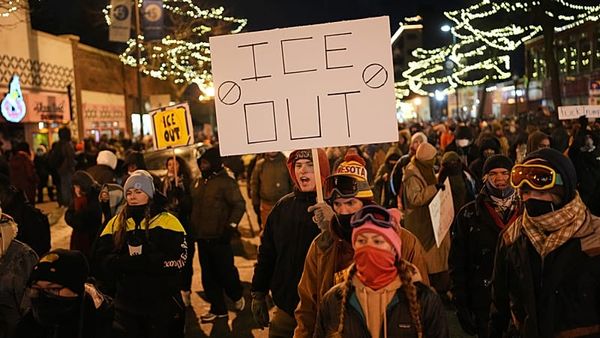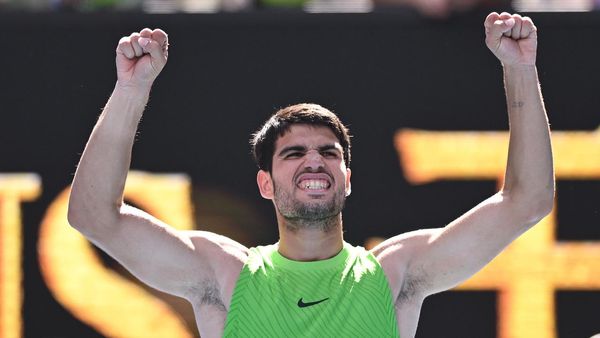
The Indian Hindi film industry, better known as Bollywood, has been cranking out films celebrating Prime Minister Narendra Modi and his controversial Hindu nationalist policies ahead of the 2024 general elections. The plots mirror the Modi administration’s divisive politics, with virtuous Hindu heroes confronting villainous Muslims. Quantity may triumph over quality, but after a decade of crackdowns, a once pluralist industry is sticking to a nationalist script.
Barely two months before polls opened in the 2024 Indian general elections, Prime Minister Narendra Modi was on a visit to the northern region of Jammu when he launched into a resounding shout-out for an upcoming Bollywood movie.
“I’ve heard that, maybe this week, a film on this 370 issue will be released,” Modi told supporters, many waving banners of his ruling Bharatiya Janata Party (BJP).
The prime minister was referring to the film “Article 370”, a political thriller that celebrates his government’s controversial 2019 decision to revoke Article 370 from the Indian constitution.
The order stripped the country’s only Muslim-majority state of Jammu and Kashmir of its statehood, depriving Indian-administered Kashmir of its special constitutional status. It was implemented amid an unprecedented security lockdown, including a months-long internet blackout and the detention of leading Kashmiri politicians.
International human rights sites and archives are choked with reports documenting the abuses and democratic backsliding sparked by the scrapping of Article 370. But while critics say Modi’s policies are anti-Muslim, they are popular with his right-wing Hindu voter base. After a decade in power, the Indian prime minister is expected to win a rare third term in office.
So on his February trip to Jammu, Modi’s confidence was evident as he plugged a movie he had not seen.
“I don’t know this film, I only heard about it yesterday on some TV station,” said Modi in Hindi. “It’s good. It will be good to show people the correct information.”
It was also very good for the filmmakers. Hours later, Yami Gautam Dhar, the lead actress in “Article 370” – who is also the wife of the film’s producer-screenwriter – expressed her gratitude to Modi. In a post on X, she said it was an “absolute honour” to watch Modi talk about the film and hoped it would “exceed” the prime minister’s expectations.
Bollywood has surpassed itself on the 2024 campaign trail, pumping out a series of nationalist films to howls of dismay from India’s weakened opposition that are drowned out by endorsements from the Modi government.
Last week, it was the southern Indian state of Kerala's turn to feature in the entertainment news. Kerala, which has sizeable Muslim and Christian communities, has a state government led by an alliance of leftist parties opposed to Modi’s Hindu nationalist central government. The BJP has little presence in many southern states and is keen to win more seats from the region in the 2024 parliamentary polls.
So when the central government-owned national broadcaster, Doordarshan, announced a Friday night screening of “The Kerala Story”, the state government objected. The controversial film was banned in some opposition-controlled states last year to “avoid incidents of hatred”. While the film was a box office hit, critics say it incites negative sentiments against India’s Muslim minority.
Calling for a withdrawal of the screening, Kerala's chief minister, Pinarayi Vijayan, said Doordarshan “should not become a propaganda machine” for the BJP. “Kerala will remain steadfast in opposing such malicious attempts to sow hatred,” said Vijayan in a statement.
From national unity movies to divisive ‘war on Bollywood’
India prides itself as the world’s largest producer of films, with an annual output of around 2,000 movies – far exceeding Hollywood’s roughly 500 movies per year.
Bollywood refers to the Hindi-language segment of the film industry in the multilingual country. It is based in Bombay, the western port city that is now officially renamed Mumbai. But the old name, redolent of a cosmopolitan time when the city was as culturally open as its harbour, continues to lend its “B” to the Hollywood rip-off monicker.
Since its birth in the 1890s, Bollywood has mirrored the times, particularly in its post-Independence heyday, when the movies highlighted themes of national unity. Crammed with song and dance routines, the films managed to weave messaging with entertainment. A particularly beloved genre in the 1960s and ‘70s was the Hindu-Muslim bhai-bhai (Hindu-Muslim brothers) movies, which typically featured brothers separated at birth and brought up under different faiths coming together at the end of the plot to reinforce their common insaniyat, or humanity.
Meanwhile the state’s film financing department supported a parallel cinema that saw artistically acclaimed but commercially less viable movies take on a range of social issues and anti-establishment themes such as caste violence, peasant uprisings and the nexuses between local criminal and political bosses.
Those films are a world away from the crop of movies being released after a decade of Modi’s rule. The “war on Bollywood” began years ago, with the BJP “using powerful tools to curtail the creative freedom of Bollywood – in particular the influence of Muslims”, noted writer Aatish Taseer in a 2021 feature in the US magazine, The Atlantic. “The measures pushed by the Modi government include indiscriminate tax investigations, trumped-up accusations against actors and directors, intimidation and harassment in response to certain movies and TV shows, and the chilling rap of law enforcement at the door” of industry people failing to toe the line.
In the lead-up to the 2024 elections, Bollywood’s instrumentalisation as a propaganda tool has risen to new heights, according to Nandini Ramnath, critic and film editor at Scroll.in, a leading Indian online news site.
“The current crop of propaganda films has themes that closely reflect, and at times mirror, the ideology, political agenda and pet themes of the ruling party. These films at times are like audio-visual extensions of the BJP’s party manifesto. They pick subjects in which the ruling party is interested and on the strength of which elections are fought. There is no attempt to critique or question the government’s motives even mildly,” said Ramnath in an interview with FRANCE 24. “The films are openly and proudly partisan, creating a kind of pro-government cinema that has not been seen on this scale before.”
Hindu heroes, Muslim villains
“Article 370”, the film that won Modi’s pre-viewing endorsement, is a case study in the new genre of pre-election propaganda movies.
Led by two heroines, Zooni, an intelligence agent (played by Gautam Dhar, the producer’s wife) and Rajeshwari, a bureaucrat at the prime minister’s office in New Delhi, the two women do the groundwork for implementing a long-held BJP campaign promise: depriving Kashmir of its special status.
Both women are improbably beautiful, successful and steely. The male heroes in contrast do not even pretend to be fictional characters. The prime minister, who is unnamed, is a Modi doppelganger, sporting his signature silver beard and clothes. The interior minister is made to look as closely as possible to the real thing: hardline Indian minister Amit Shah.
Then there’s the villain, the mandatory Bollywood baddie. He’s a Muslim. And a terrorist. But not any old terrorist. He’s Burhan Wani, a charismatic Kashmiri militant who was killed, aged 22, in a gunbattle with Indian security forces. Wani’s 2016 funeral drew thousands of mourners in Kashmir. While the militant was considered a terrorist by the Indian state, for many Kashmiris Wani represented the spirit and political aspirations of a younger generation unbeaten by decades of a brutal counterinsurgency.
None of the nuances make it into the movie. Muslims in the new slate of Bollywood propaganda movies are unmitigatedly evil.
In “The Kerala Story”, Muslims are proponents of “love jihad”. A BJP bugbear, “love jihad” combines an abhorrence of interreligious marriages and obsession with communal purity to purport a conspiracy theory that Muslim men target Hindu women for conversion by seducing them. In the 2023 film, a Hindu woman is seduced into joining the Islamic State (IS) group and lands up in a terrorist-infested Mideast war zone.
The Muslim terrorist stereotype predates the current regime and emerged on Bollywood screens after the Kashmir insurgency erupted in 1980s, explains film historian and critic Karan Bali.
But the portrayal of the characters has changed in recent years, he notes. "These latest films are different because they are a lot cruder and very direct in terms of making the Muslim the enemy," said Bali. "They're very black and white, there's no nuance or gray in the middle."
Tax breaks, free tickets and market glut
Propaganda films do not necessarily spell box office success but they’re rarely a losing proposition for film-makers, leading to a glut of such movies in the market.
Films that support the Modi administration’s Hindu nationalist policies are often given tax breaks at the box office in BJP-ruled states. “This means the ticket prices are much lower, which means that obviously attracts more people to go and see it,” said Bali, noting that in some cases, government departments have even given free tickets to employees, underscoring an official endorsement.
“When Modi and his ministers support a film publicly and then it goes on to get tax breaks, it signals that the leaders not only approve of such films, but that such films deserve to be seen by the wider public. The films get automatically folded into the other messaging that the ruling party, as well as the central government, regularly puts out,” explained Ramnath.
With a 1.4 billion population, the world’s most populous country has a drawn-out voting schedule to manage the logistical challenges of holding national elections. The 2024 vote from mid-April to early-June takes place in seven phases, making it easier for films to reach target audiences.
“The Sabarmati Report” for instance will be released on May 3, four days before Modi’s home state of Gujarat goes to the polls.
The film gets its name from the Sabarmati Express, the train that made headlines in 2002, when 59 Hindu pilgrims on board were killed in a fire near the Godhra train station in Gujarat. The deaths triggered one of India’s worst anti-Muslim riots.
Modi was chief minister of Gujarat at that time. He has consistently denied allegations of complicity in the violence, the Indian courts have acquitted him, but the 2002 Gujarat riots remain an extremely sensitive topic.
Last year, the BBC’s two-part documentary series, “The Modi Question” examining his actions during the 2002 carnage was banned in India. The BBC’s India offices were subsequently raided by tax authorities. The Indian government denies any link between the BBC documentary and the tax raids.
Read moreDaughter of detained ex-Gujarat policeman wants Macron to speak up during Modi visit
The release of “The Sabarmati Report” just days before Gujarat goes to the polls sends a powerful signal about the official narrative in one of Indian history’s darkest communal chapters. After a decade of overseeing a “war on Bollywood” and cracking down on press freedom as well as the political opposition, Modi can be certain the upcoming film will be very different from the BBC’s “The Modi Question”.
In his February 20 plug for “Article 370”, the populist prime minister cracked a joke about figures that are important for his voter base.
“Friends, look at the strength of this 370. Because of 370, today people will give us 370 seats in the elections and make it 400 seats” in parliament, he said, referring to the BJP goal for an absolute majority in India’s 545-seat lower house of parliament.
The math, messaging and movies all seem weighted in Modi’s favour. But Indian elections can sometimes throw up surprises. The 2024 vote could be a good show to watch.







